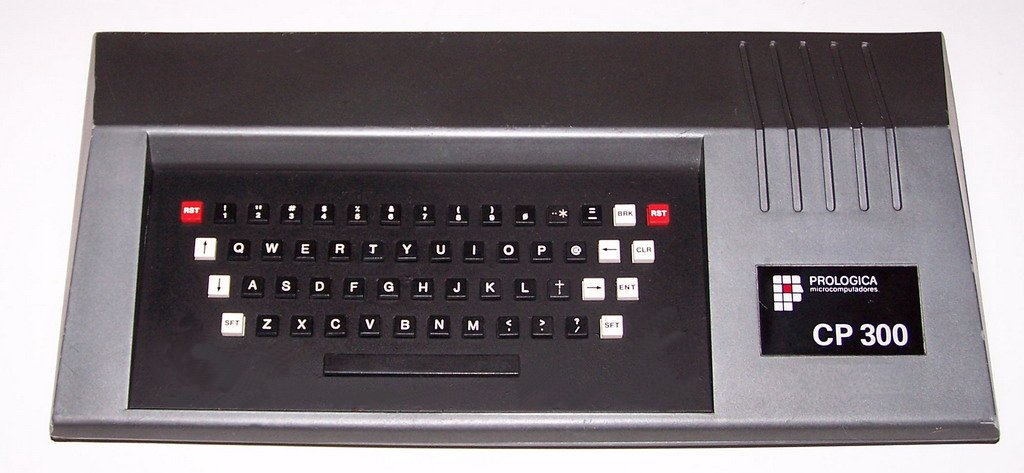Passion: Your #1 Skill
I think it’s needless to say that Professor Isidro is passionate about his profession, right?
But do you know how it all started? Check this out:

This is the CP300, the first computer I ever saw in my life!! My mother worked at a school that decided to innovate and set up a computer school with these devices!! Awesome!!! I saw someone programming in BASIC, drawing an “emoji” that occupied the entire screen (green with a black background). On that day, I said to myself: this is what I want to do for the rest of my life!
Well, my mother and father bought into the idea, and I enrolled in all the possible courses the school could offer: Basic, DOS, DBaseIII Plus, Clipper, Dataflex, FoxPro, CorelDraw, AutoCAD, and whatever new things came up, Isidro was there to enroll.
So, because of that, my first real software was created when I was in high school (the year was 94, 95) while preparing to enter Computer Science. It was a payroll system created in Clipper Summer 87 (you should research how old that is!!!) that helped my mother for a long 10 years until she retired. This system saved her many hours of work because my mother used to type all payment receipts for more than 150 school employees. It took her almost a week to calculate and type everything. When the system was implemented, the nearly 1-week job was reduced to a few hours, and printing took only a few minutes. It was incredible for her.
This brought me a lot of satisfaction because, even without knowing it, I understood that software is only software when it’s useful to someone; otherwise, it’s just a bunch of lines of code.
And, as a passionate person, I started wanting to study more. I got my bachelor’s, master’s, and Ph.D., and I never stopped studying.
Is being passionate about what you do a good thing? Of course! Passion is one of the great fuels that allow us to start new projects, face new challenges, seek new knowledge, and always want to learn more.
And that’s where the problem of the passionate person lies.
When we are truly passionate, we often fall into the trap of starting many things, developing them a little, and almost never finishing them.
In other words, we have great initiative, moderate or even weak execution, and almost no completion. Why is that? Because, as good enthusiasts, the same speed that makes us want to start also makes us quickly lose interest in things and not finish them.
Note: This article itself… I was eager to write it right after my talk at the Campus Party (where I spoke about it), but if I didn’t set a deadline for myself, I would have let it pass (because obviously, other things would take higher priorities).
Well, how do you overcome the inertia of starting many things and not finishing them? In fact, the “magic formula” that I eventually discovered the hard way is to try to filter projects that I would get into or not. But based on what criteria would I say “no” to some projects?
Since we’re programmers, we love frameworks, right? So… I ended up organizing my criteria into a framework. I called it the
Framework of the 3 Ws for personal projects.
Huh?
Yes… it’s 3 questions that I have to ask myself before diving into a project.
- Why?
- For whom?
- By when?
This may sound ridiculous, but it effectively helps you filter out cool things. Look how cool it is:
Why?
Answering this question will give you the Purpose of your project. That’s what will motivate you to do it. You (just like me) might try to deceive yourself by saying “just because” or “because I want to,” or “because I’ll learn something new.” But if it doesn’t have a purpose that will make you wake up earlier or stay up later to work on it, maybe your project isn’t worth it.
For whom?
This question reflects the real Utility of the project. Remember that I mentioned earlier that software needs to be useful? Well, who is going to use this project? Or is it something that will be completed and then “abandoned” in some repository, or, if it’s an Arduino project, will it just take up space on tables, in drawers, or around the house?
By when?
Answering the first two questions will be a piece of cake when you come across this one. This defines a deadline. A project without a deadline is not a priority. Why is this so important? To finish it! To stop procrastinating (like I also procrastinate too much) and get moving! Your project needs to get done; it needs to have an endpoint. And you are the only one responsible for it. This somewhat resembles the SMART goals. Have you heard of them? Every life goal (whether short-term, medium-term, or long-term) needs to be SMART:
- S: Specific
- M: Measurable
- A: Achievable (given the resources you have)
- R: Relevant (it needs to have some meaning for you, a purpose)
- T: Timed (with a defined deadline) It may sound nice, Isidro, but what about when you have an entrepreneurial profile and you pursue professional projects that might even generate some income?
That’s where the Extended 3 Ws Framework for professional projects comes in.
It’s the same as the previous framework with the addition of one more question:
For how much?
Answering this question gives you a sense of viability. Is the effort, the tight deadline, or even the somewhat odd purpose worth it for what you’re going to receive in return? If it is, go for it. If not, think twice and exercise what is a consequence of applying these steps: SAYING NO.
For a long time, I was also afraid to say no. Saying “no” can be simple, with a smile on your face, in a courteous, polite, and simple manner, just as you are. And it can save you from getting into various messes because if “no” isn’t replaced by a “maybe” or even a “let’s do it,” perhaps the headache later will be much greater, and that’s when the framework will truly make sense to you.
Got it?
In conclusion: as a passionate teacher, I don’t teach anything to my students that I haven’t tested myself. These small steps have really worked for me and have allowed me to have more peaceful nights and fewer guilty feelings. Give it a try and let me know what you think.




